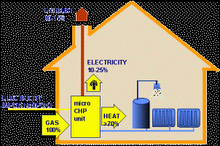Wednesday, 6 May 2009
Baxi micro CHP leads the way?
At last some recognition of the benefits of micro CHP! At the Micropower Awards last week, Baxi won the award for innovation for their Ecogen micro CHP unit against all other Microgeneration technologies. So I should be deliriously happy that the industry has actually recognised that a fossil fuelled technology can make a significant contribution to the low carbon future...or should I? At the Micropower conference preceding the awards ceremony, there was a wonderful presentation from NERA, consultants to the UK Government (DECC) on the economics of the forthcoming FIT. An excellent, well argued case for prioritising support for technology measures based on either carbon mitigation cost and/or cost per kWh of renewable energy produced; somewhat tarnished by the following pronouncement from DECC that they would probably cave in to the persistent lobbying of the eco-bling PV industry regardless and give them disproportionately large subsidies anyway because, well...they need the money! Quite why the fuel poor of the UK should be forced to subsidise the vast corporate PV industry beats me. However, this is what happens when you get government by sound bite and technology adoption by target. When asked why the FIT for electricity generation was being fast-tracked to the detriment of the far more significant RHI for heat-based measures, and why there was no planned government support at all (not even proposed, not even under consideration) for technologies which might tackle serious problems such as cooling in buildings ( a major energy consumer in most of Western Europe), the DECC spokesman admitted that they were not looking at cooling "because there is no EU target for cooling". Well that's a relief! The EU has decided to bury their head in the sand over cooling to focus their attention on really useful electrical technologies like PV (the most carbon inefficient measure of all) and climate change will just go away. Maybe we should just pass a law banning climate change and, by the same process, it will just cease to be a problem. I dread to imagine what nonsense the UK government will come up with for the FIT if they are so short sighted that their policy is to be based on "targets" rather than the reality of climate change or any semblance of economics or common sense.
Labels:
Baxi,
climate change,
feed-in tariff,
FIT,
fuel poverty,
microgeneration,
micropower,
PV,
RHI,
Stirling engines
Subscribe to:
Post Comments (Atom)

2 comments:
PV most inneficient of them all?
But so is wind. However high efficiency won't solve the climate change problems neither will natural gas fueled micro-CHP (a technology which has very small suitable applications). Not to mention the unsustainability of a fossil fuel.
However PV and Wind also have their application, If anyone is serious on their carbon footprint they will go renewable however inneficient that process may be. Hence why FiT heavily promote renewable techs.
By the way good job with the blog, but you could keep updating it and add a few features, Im sure it would attract loads of people considering there will be a lot more talk on this subject for next few years.
Andre
Thanks for your comment. Perhaps I should clarify. I am talking about carbon efficiency or perhaps more accurately "carbon cost effectiveness". As I have commented previously, PV is not very low carbon if you consider the embodied carbon and the relatively poor yields in UK and Northern Europe. The current proposals for FIT in UK imply a PV subsidy of around £500 per tonne for carbon (even ignoring embodied carbon), whereas micro CHP and heat pumps can achieve carbon savings for less than one tenth of this amount.
In a world of finite resources we should surely prioritise solutions which are most cost effective before resorting to lower merit alternatives.
As regards micro CHP, I do not understand your comment about "small suitable applications". If what you mean is that micro CHP is only suitable for small heat and power loads, then I totally agree; that is the definition of micro CHP. But if you mean "few" applications I could not disagree more strongly; micro CHP based on engines is suitable for around half the UK homes and could represent 12GWe generating capacity, about the same as current nuclear capacity, so hardly insignificant! Fuel cell micro CHP would add around the same again.
However, you are right about long term fossil fuel availability and I see micro CHP as a transitional technology for the next few decades, gradually giving way to heat pumps as the grid decarbonises and gas becomes more expensive or unavailable.
As far as renewable electricity is concerned, wind costs around 8p/kWh compared with PV at more than 40p/kWh and has much lower embodied carbon. Where would you invest your limited funds?
Post a Comment